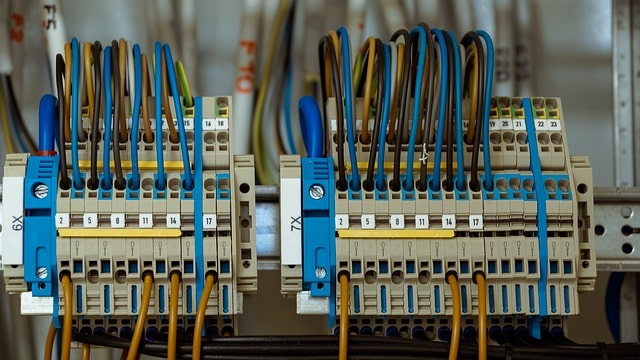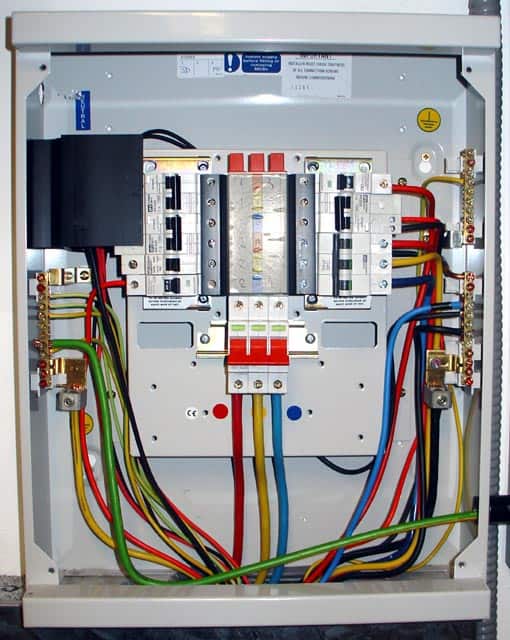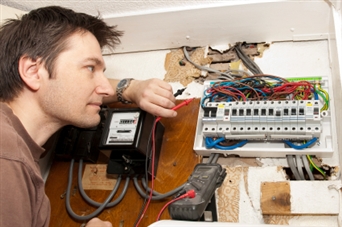Electricians – What They Do
Electricians install and maintain all of the electrical and power systems for our homes, businesses, and factories. They install and maintain the wiring and control equipment through which electricity flows. They also install and maintain electrical equipment and machines in factories and a wide range of other businesses.
Electricians usually start their work by reading blueprints – technical diagrams that show the locations of circuits, outlets, load centers, panel boards, and other equipment. After determining where all the wires and components will go, electricians install and connect the wires to circuit breakers, transformers, outlets, or other components and systems.
When installing wiring, electricians use handtools such as conduit benders, screwdrivers, pliers, knives, hacksaws, and wire strippers, as well as power tools such as drills and saws. Later, they use ammeters, ohmmeters, voltmeters, harmonics testers, and other equipment to test connections and ensure the compatibility and safety of components.
Maintenance electricians repair or replace electric and electronic equipment when it breaks. They make needed repairs as quickly as possible in order to minimize inconvenience. They may replace items such as circuit breakers, fuses, switches, electrical and electronic components, or wire.
Electricians also periodically inspect all equipment to ensure that it is operating properly and to correct problems before breakdowns occur.

WHAT ARE COMMERCIAL ELECTRICAL INSTALLATIONS?
Commercial electricians generally handle the installation and maintenance of electrical components in businesses. This includes office buildings, housing developments, hospitals, and schools. These typically involve security systems, air conditioning systems, cabling, lighting, and other equipment.
Commercial electrical installations are very different from residential ones in several essential ways. In business premises, new wiring remains fully accessible and out in the open, typically safeguarded by conduits to protect against hazards.
Electrical wiring in business premises uses thermoplastic materials featuring nylon high resistance coating inside the conduit to protect wiring. If flammable liquids, gases, or other hazardous substances are in the environment, the electrician will make sure wiring and outlets are installed a safe distance away from these components. Depending on the potential hazards nearby, special insulation might be used to further shield the wiring.
The majority of commercial installations require 3-phase power installation. This involves a 208-volt wide leg with a neutral wire and two 120-volt legs. These voltage qualities are essential to keep motors and wiring operating properly in commercial environments.

The Importance of Electricians in Industries
To become an industrial electrician takes commitment to education and apprenticeship before you are trained to master the trade and get a job. Once you do, you’re on the path to a rewarding career. You know the rules and regulations to work with different industries and have the expertise and experience to work with industrial systems and machinery. You ensure that businesses continue to receive power to function productively.
Responsibility
As an electrician at an industrial site, clients trust you with installing electrical power and systems, telecommunications, fire and security systems and electronic controls. Your job involves installing wiring, servicing electrical equipment and installing equipment. The electrical work you perform could include new work, additions, a change to a job already done, maintenance of equipment or repair work for a faulty condition.
Skills
In the industrial sector, your job as an electrician is critical to support the growth in the construction industry, steel production, manufacturing and electrical power companies. Through your apprenticeship, you develop skills to interpret drawings and blueprints and understand electrical code specifications. You will have the skills to install, replace and repair wiring, conduits, lighting and other fixtures and electrical components. You can expect to work full-time or in shift-work.
Outlook
Your role as an electrician is important in the construction industry as well as the manufacturing sectors to maintain and replace older equipment. With government approval, the emergence of solar and wind alternative power generation will require installation services and links to power grid connections. According to the Bureau of Labor Statistics, the factory sector provides the most stable employment for electricians. Acquiring a wide variety of skills will open opportunities for you in various industries.
Education
To become an industrial electrician, after completing your high school diploma, you should complete a four-year apprenticeship program requiring at least 144 hours of technical training and 2,000 hours of paid practical training. In class, you will learn industrial electrical theory, blueprint reading, electrical code requirements and safety and first-aid practices as well as training in soldering, communications, fire alarm systems and elevators. This training will qualify you to do both construction and maintenance work. Each state has its own requirements to practice.

What is a electrical installation condition report or periodic inspection?
An Electrical installation condition report or Periodic
Inspection is an inspection on the condition of an existing electrical
installation, to identify (in order of priority) any deficiencies against the
national safety standard for electrical installations.
Why is a electrical installation
condition report or periodic inspection needed?
Every electrical installation deteriorates with use and age. It is critical to maintain these installations to ensure that the safety of users is not put at risk and that installations remain in a safe and serviceable condition.
When is a electrical installation condition report or periodic inspection needed?
In section periods depends on the premise type. It is recommended that Electrical installation condition reports or periodic inspection and testing is carried out at least every:
- 5 years for commercial properties. This can either consist of a 100% inspection every 5 years or broken down to rolling programme of 20% inspections every year. Using the latter method ensures that the installation is checked once a year for faults.
- 10 years for domestic properties.
What qualifications or licenses do residential and commercial electricians need?
Unlike other construction-type jobs, electrical work requires more extensive education and licensing requirements. Electricians must work as apprentices for a period before they can become licensed electricians. It does not matter whether an aspiring apprentice wants to specialize in either a commercial or residential electrical work. Becoming a licensed electrician requires three steps:
- Complete a four-year apprenticeship program.
- Complete one year of formal training and work under a journeyman electrician for hands-on training.
- Once an apprentice completes their formal training, they must pass two location-specific exams to receive their license and master electrician certificate.
Once an apprentice completes these three steps, they will have the required licenses to practice their trade on their own without the supervision of a journeyman electrician. It’s important to note that different states and local governing bodies will have different sets of licensing requirements for electricians. Some states will require more extended periods of working under a journeyman electrician which can influence when and how an apprentice can become authorized to wire either commercial or residential buildings.